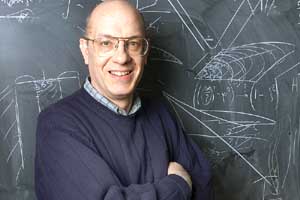American Physical Society honors Witten
By Steve KoppesNews Office
 Thomas Witten |
The University’s Thomas Witten has been awarded the 2002 Polymer Physics Prize of the American Physical Society. The society cited Witten, a Professor in Physics and the College, “for outstanding theoretical contributions to the understanding of polymers and complex fluids.” The prize is sponsored by the Ford Motor Company and was awarded at a meeting earlier this month in Indianapolis.
“Tom Witten has had a far-reaching impact on the entire field of polymers, complex fluids and aggregation phenomena,” said Sidney Nagel, the Stein-Freiler Distinguished Service Professor in Physics and the College. “His work has been characterized by a very original approach combined with a thorough and deep analysis of the problems on which he works.”
Polymers, complex fluids and aggregation phenomena sound esoteric, but in fact they often are the stuff of everyday life. In recent decades they have forced physicists to broaden their notion of how matter behaves, Witten said.
Scientifically speaking, polymers are substances that consist of long, flexible chains of identical molecules. Practically speaking, they are found in virtually every household. Styrofoam, from which plastic cups are made, is a common example of a synthetic polymer. But polymers also occur naturally and are a common feature of living cells.
Unlike such simple fluids as water and gasoline, complex fluids flow in a springy, syrupy way because they contain large, floppy objects that deform and store energy in a flow. Often these objects are polymers. Examples of such complex fluids are mucus, paint and toothpaste.
The aggregation phenomena that Witten studies occur when falling snowflakes clump together, or when carbon-black soot builds up near a dirty flame. Carbon black is made industrially and is used in the manufacture of tires to make them strong, Witten said.
Witten has contributed to the physics of polymers, complex fluids and aggregation phenomena by more rigorously describing their behavior mathematically, leading scientists to new levels of understanding.
His interest in mathematical tools called fractals led him to his theoretical studies of polymer physics.
“It amazed me to learn that the mysterious mathematical symmetry of a fractal governs the behavior of many pervasive forms of soft matter, such as polymers,” Witten said.
![[Chronicle]](/images/small-header.gif)